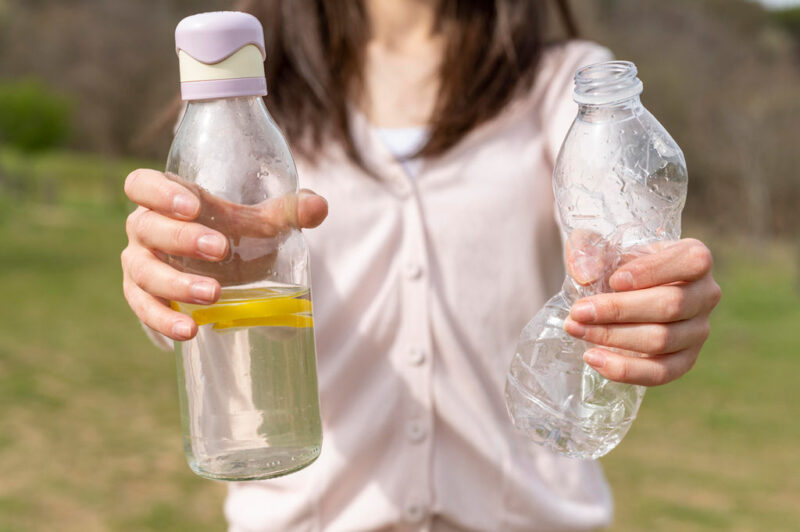Introduction:
wellhealthorganic.com know why not to reuse plastic water bottles know its reason in hindi :Water bottles, often designed for single-use, may leave environmentally conscious consumers wondering if they can safely be reused.
The safety of reusing these bottles depends on the type of plastic they are made from. Here, we explore the common types of plastics found in water bottles and address concerns regarding chemical leaching and bacterial growth.
Also read : Harshad mehta bull run rajkotupdates news
Types of Plastic Bottles wellhealthorganic :
- Polyethylene terephthalate (PETE or PET):
- Identified by the number “1” inside the recycling triangle.
- Generally safe for single and repeated use, with low risks of chemical leaching.
- Avoid exposing PET bottles to extreme temperatures to minimize the risk of antimony leaching.
- High-density polyethylene (HDPE):
- Recognizable by the “2” in the recycling symbol.
- A sturdy and durable plastic suitable for reuse if properly washed and undamaged.
- Low risk of chemical leaching.
- Other (Category 7):
- Labeled with a “7,” this category includes plastics that don’t fit into other categories.
- Some may contain bisphenol A (BPA), a chemical linked to hormonal disruptions.
- Exercise caution with polycarbonate bottles under this category, as they may leach BPA.
Chemical Leaching wellhealthorganic.com know why not to reuse plastic water bottles know its reason in hindi :
Also read : windows-11 rajkotupdates.news
- PET Plastics (Type 1):
- Generally considered safe for reuse, with low risks of chemical leaching.
- Proper storage at room temperature and away from sunlight is essential.
- HDPE Plastics (Type 2):
- Safe for reuse if cleaned thoroughly and undamaged.
- Low risk of chemical leaching.
- Type-7 Plastics:
- Some may contain BPA, posing potential risks.
- Avoid polycarbonate bottles and BPA-containing plastics if concerned about chemical leaching.
Bacterial Growth:
- Bacterial growth is a significant concern with reused plastic bottles.
- Proper washing and maintenance are crucial to minimize the risk of harmful bacteria.
Alternatives to Plastic Bottles:
- Reusable stainless-steel or glass bottles are recommended alternatives.
- Easy to clean and eliminate concerns about bacterial growth and chemical leaching.
- Environmentally friendly options contributing to sustainability.
Read more : rajkotupdates.news : us inflation jumped 7.5 in in 40 years
Conclusion:
wellhealthorganic.com know why not to reuse plastic water bottles know its reason in hindi :While some plastic water bottles can be safely reused with proper care, the environmental and health-conscious consumer may find reusable stainless-steel or glass bottles to be more reliable alternatives. These options offer ease of cleaning, eliminate bacterial growth concerns, and contribute to a more sustainable lifestyle.
FAQ
1. Can I safely reuse plastic water bottles?
Yes, in many cases, you can safely reuse plastic water bottles. However, it’s essential to consider the type of plastic the bottle is made from. Some plastics may release harmful chemicals when exposed to heat or repeated use. Look for bottles with recycling codes 1 (PETE) or 5 (PP), as these are generally considered safe for reuse.
2. How many times can I reuse a plastic water bottle?
wellhealthorganic.com know why not to reuse plastic water bottles know its reason in hindi : The number of times you can safely reuse a plastic water bottle depends on factors like the type of plastic, how well you clean it, and how frequently you use it. It’s advisable to replace bottles that show signs of wear, scratches, or cloudiness, as these can harbor bacteria and be harder to clean.
3. Is it safe to refill plastic water bottles and leave them in the sun?
Leaving plastic water bottles in the sun can lead to the release of harmful chemicals. It’s best to store plastic bottles in a cool, shaded place. Additionally, if a bottle is labeled as single-use, it’s not intended for prolonged use or exposure to heat.
4. How should I clean reusable plastic water bottles?
To clean reusable plastic water bottles, use warm water and soap. Some bottles are dishwasher-safe, but check the manufacturer’s recommendations. Avoid using harsh chemicals or bleach, as they can degrade the plastic and potentially release harmful substances.
5. Are there health risks associated with reusing plastic water bottles?
While using plastic water bottles can be safe, there are concerns about the potential release of harmful chemicals, especially when exposed to heat. BPA (bisphenol A) and phthalates are two examples. To minimize risks, choose bottles labeled as BPA-free, avoid exposing them to high temperatures, and replace them periodically.

